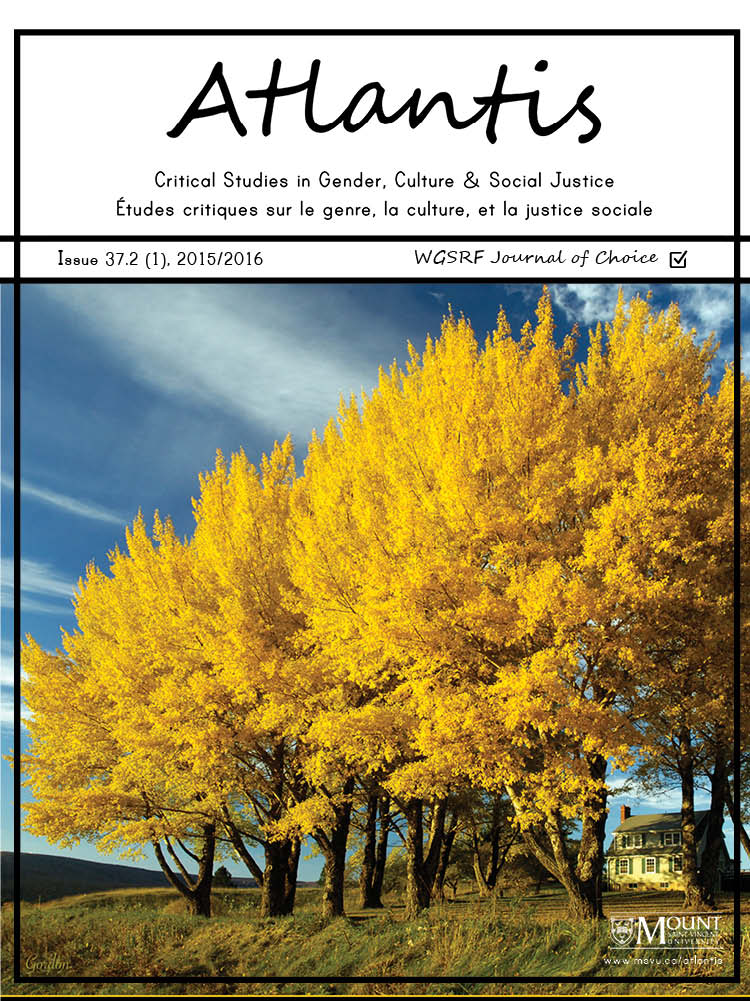Punished for Strength: Sex Worker Activism and the Anti-Trafficking Movement
Keywords:
Sex work, Human trafficking, CanadaAbstract
Abstract
This article is a reflection on my work as a sex worker and activist amid the global concern over human trafficking. I highlight the challenges that sex workers can experience as we attempt to position ourselves within discursive frameworks that define us by our injuries. I contend that the focus on injuries risks obscuring the varied experiences of performing sexual labour, the contributions to knowledge made by sex working people, and the solidarity within sex working communities.
Résumé
Cet article est une réflexion sur mon travail comme travailleuse du sexe et militante au sein de la préoccupation internationale au sujet de la traite des personnes. Je souligne les défis que peuvent rencontrer les travailleuses du sexe lorsqu’elles tentent de se positionner au sein de cadres discursifs qui les définissent par les préjudices qu’elles subissent. Je soutiens que l’accent mis sur les préjudices risque d’obscurcir la variété des expériences du travail sexuel, les contributions aux connaissances faites par les travailleuses du sexe et la solidarité au sein des communautés du travail du sexe.
References
Bruckert, Christine and Colette Parent. 2004. Organized Crime and Human Trafficking in Canada: Tracing Perceptions and Discourses. Research and Evaluation Branch, Royal Canadian Mounted Police, Ottawa. Available at: http://publications.gc.ca/collections/Collection/PS64-1-2004E.pdf
Doezema, Jo. 2001. “Ouch: Western Feminists’ ‘Wounded Attachment’ to the ‘Third World Prostitute’” Feminist Review. 67(Spring).
Farley, Melissa. 2006.“Prostitution, Trafficking, and Cultural Amnesia: What We Must Not Know to Keep the Business of Sexual Exploitation Running Smoothly” Yale Journal of Law and Feminism. 18(109).
Galloway, Gloria. “Human-Trafficking Crackdown Seen by Some Sex Workers as Bullying Tactic.” Globe and Mail, January 27.
Gunilla Ekberg. 2004 “The Swedish Law that Prohibits the Purchase of Sexual Services: Best Practices for the Prevention of Prostitution and Trafficking in Human Beings” Violence Against Women. 10(10).
Hughes, Donna. 2000. “The ‘Natasha’ Trade: The Transnational Shadow Market of Trafficking in Women”Journal of International Affairs. 53(2).
Jeffreys, Elena. 2011. “Why Feminists Should Listen to Sex Workers.” The Scavenger June 11. Available at: http://www.thescavenger.net/feminism-a-pop-culture/why-feminists-should-listen-to-sex-workers-732.html
Kempadoo, Kamala. 1998. “Sex Workers’ Organizations: Introduction,” in Kamala Kempadoo and Jo Doezema, eds., Global Sex Workers: Rights, Resistance, Redefinition. New York: Routledge.
Kempadoo, Kamala. 2005. Trafficking and Prostitution Reconsidered: New Perspectives on Migration, Sex Work, and Human Rights. Boulder: Paradigm Publishers.
Koyama, Emi. 2011. War on Terrorism and War on Trafficking: A Sex Worker Activist Confronts the Anti-Trafficking Movement. Portland, Oregon: Confluere Publications.
Poulin, Richard. “Globalization and the Sex Trade: Trafficking and the Commodification of Women and Children.” Canadian Woman Studies. 22(3/4).
Downloads
Published
Issue
Section
License
Copyright (c) 2016 Atlantis: Critical Studies in Gender, Culture & Social Justice

This work is licensed under a Creative Commons Attribution 4.0 International License.
Authors who publish with this journal agree to the following terms:
1. Authors retain copyright and grant the journal right of first publication, with the work simultaneously licensed under a Creative Commons Attribution 4.0 International License that allows others to share the work with an acknowledgement of the work's authorship and initial publication in this journal.
2. Authors are aware that articles published in Atlantis are indexed and made available through various scholarly and professional search tools, including but not limited to Erudit.
3. Authors are able to enter into separate, additional contractual arrangements for the non-exclusive distribution of the journal's published version of the work (e.g., post it to an institutional repository or publish it in a book), with an acknowledgement of its initial publication in this journal.
4. Authors are permitted and encouraged to preprint their work, that is, post their work online (e.g., in institutional repositories or on their website) prior to and during the submission process. This can lead to productive exchanges, as well as earlier and greater citation of published work. Read more on preprints here.







